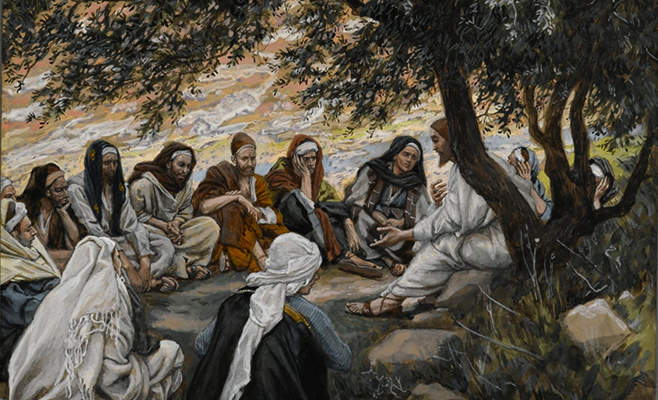
Love in Service
Homily 25th Sunday Yr B: Love in Service
Fr. Dwight P. Campbell, S.T.D.
Jesus foretold His passion and death three times to His Apostles.
In last week’s Gospel, St. Mark relates the first time, when Peter protested at hearing this and Jesus responded “Get behind me Satan. Your are not thinking as God does but as men do.”
In today’s Gospel, Jesus makes his second prediction of His upcoming passion and death. This took place after Jesus’ Transfiguration on Mount Tabor. Jesus says: “The Son of Man will be handed over to men are and they will kill him, and three days after his death the Son of Man will rise.”
St. Mark tells us that Jesus’ disciples “failed to understand his words” and that “they were afraid to question him.” Why was this? Because as Jews, based upon Old T prophecies, the disciples knew that the Messiah would be a king; and as most of the Jews they were expecting a king who would establish an earthly kingdom, restoring Israel to its former glory under King David 1,000 years earlier.
The disciples had no idea that Jesus came to establish the kingdom of Heaven on earth through the Church that He would found on Peter and the Apostles, and that this Kingdom would be fulfilled and perfected only in heaven.
They and other Jews overlooked the Old T prophecies which foretold that the Messiah would suffer – like that from the Book of Wisdom, our first reading: “Let us beset the just one, because he is obnoxious to us; he . . . reproaches us for transgressions of the law . . . Let us condemn him to a shameful death.”
Not only that, the disciples thought that they themselves would be given positions of power and authority in this earthly kingdom.
This misunderstanding by the Apostles explains why they were arguing who was going to be the most important, the greatest, in this earthly kingdom. (Just think – the Apostles had been with Jesus for a couple of years by now and they are still so petty, arguing about who among them is the greatest!)
Jesus takes this opportunity to teach them a lesson that is essential to the whole Gospel message: that those who will rank first in the Kingdom of Heaven will not be those who seek to be the first and greatest, but rather those who seek to be the least, and the servants of all.
In today’s Gospel, Jesus makes clear that true greatness is measured by service to others, being a servant to all.
What precisely constitutes being a servant of all, service to others?
First of all, it must be done in love. Mother Teresa of Calcutta (St. Teresa) I uttered one of my favorite lines: “Faith in action is love, and love in action is service.”
There’s an old saying, that you spell love with four letters: T-I-M-E. If you love someone you spend time with them.
Loving service to others requires that we sacrifice our time – for their benefit or their need.
Moreover, sacrificing our time, talents and energy for others necessarily entails a renunciation of self – of a selfish, self-seeking attitude; of dying to self for others; detaching ourselves from self and committing ourselves to the service of God and neighbor, in love and for love.
This is why in last week’s Gospel Jesus said that if we want to follow Him, to be His true disciples, we must deny our very selves: “Whoever loses his life for my sake and the sake of the Gospel will save his life.”
St. Francis de Sales said: “To love our neighbor in charity is to love God in man.”
Dying to oneself and one’s self interest practically means to always seek the good of others; to put other peoples’ good and well-being before our own; to seek the happiness and welfare of others before our own happiness.
Now, to a worldly person, this Gospel message of Jesus sounds as if it would make for a dreary and depressing life; a life of no fun and enjoyment.
But herein lies one of the great paradoxes or apparent contradictions of Christianity: The more we sacrifice our time, talents and energies for others and put their interests before our own, the greater joy we experience in this life.
How can this be? It is a mystery, solved in Christ, who spent Himself for others. And the lives the saints who followed Jesus give witness to this beautiful truth.
Those who live lives centered on themselves, lives of selfish self-interest and self-indulgence, who pursue only of comfort and pleasure, are often the most unhappy and sad people. Their lives lack true joy.
The more we give of ourselves God and others, the more we receive.
The more we die to self in imitation of Christ, the more He will pour His life into us.
The more we strive to be the last of all and the servant of all, the more we experience those great Fruits of the Holy Spirit: authentic peace and joy – in this life, and in the Kingdom of Heaven.
